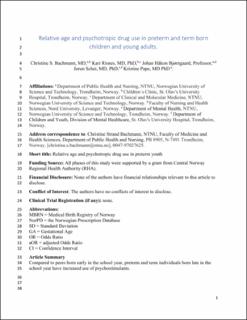Relative age and psychotropic drug use in preterm and term-born children and young adults
Peer reviewed, Journal article
Accepted version
Permanent lenke
https://hdl.handle.net/11250/3052588Utgivelsesdato
2022Metadata
Vis full innførselSamlinger
Originalversjon
10.1542/peds.2022-057085Sammendrag
Background and Objectives
Being among the youngest within a school class is linked to disadvantages in various educational and mental health domains. This study aimed to investigate whether preterm born infants are particularly vulnerable to relative age effects on mental health, not previously studied.
Methods
We used registry data on all Norwegians born between 1989 and 1998 to compare prescription status for psychostimulants, antidepressants, hypnotics, anxiolytics, and antipsychotics per year from age 10 to 23 years (2004-2016) between exposure groups with different time of birth in the year (relative age) and different gestational age (preterm versus term).
Results
Of 488 470 individuals, 29 657 (6,1%) were born preterm. For term born in November/December, the adjusted odds ratio (aORs) for psychostimulant prescription compared with peers born in January/February was 1.80 (95% confidence interval [CI], 1.69–1.91) at ages 10 to 14 years, and 1.17 (95% CI, 1.08-1.27) at ages 20 to 23 years. Within preterm born, the corresponding results were 1.39 (95% CI, 1.13-1.69) and 1.34 (95% CI, 1,00–1.78) at ages 10 through 14 and 20 through 23 years, respectively.
Conclusions
Being relatively young within the school group was associated with increased psychostimulant prescription in the preterm as well as the term population. In contrast to term peers, the relative age effect for psychostimulant prescription seemed to persist to young adulthood for the preterm population. The results suggest that preterm individuals are vulnerable to long-term effects of relative immaturity and that they require careful consideration from both health care professionals and the school system.
Topics:
attention-deficit/hyperactivity disorder, peer group, psychostimulant, psychotropic drugs, antidepressive agents, antipsychotic agents, adult attention deficit hyperactivity disorder, mental health, young adult, knowledge acquisition

